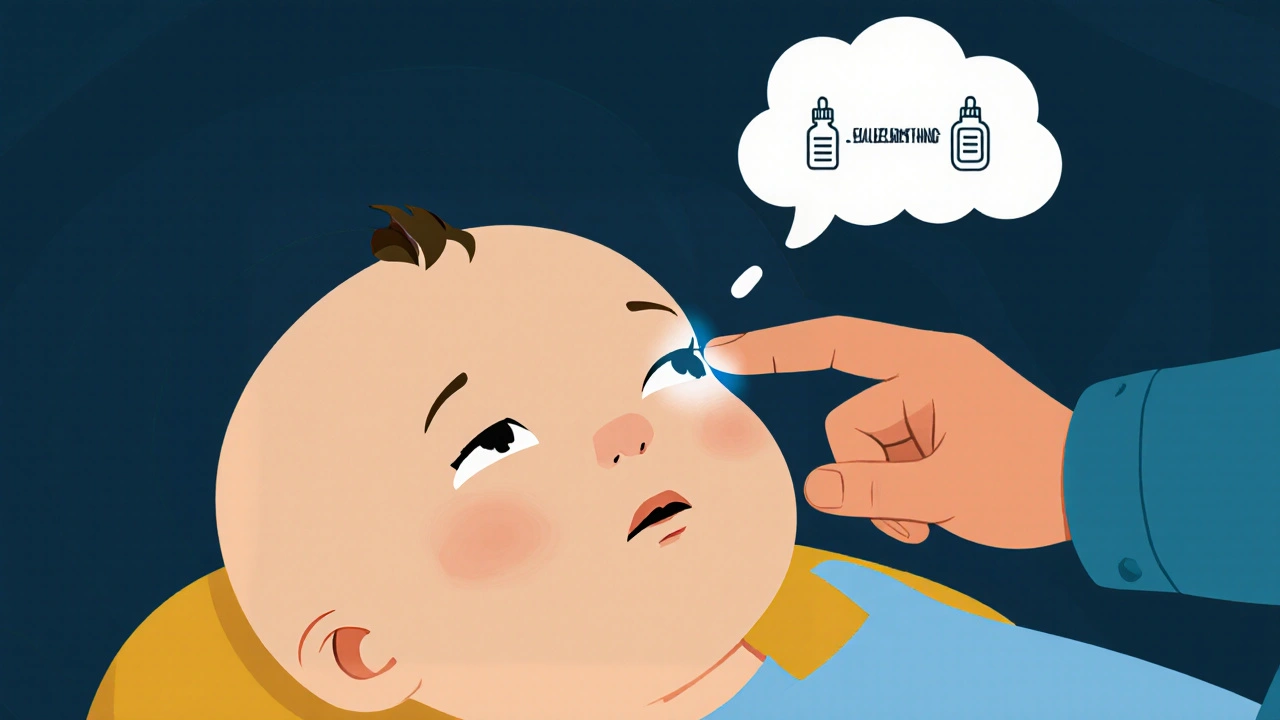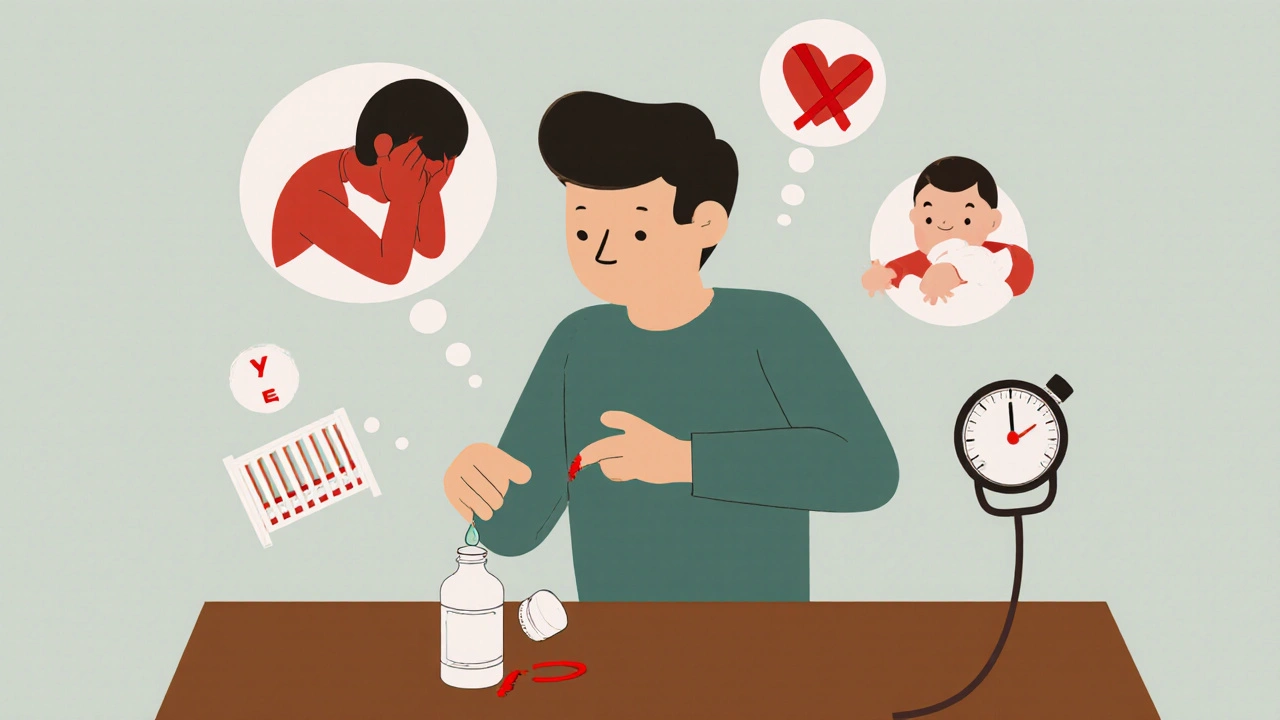Bringing a bottle of brimonidine tartrate eye drops home after a doctor’s visit feels like a win-until you realize you’re not sure if it’s safe for you. This medication helps lower eye pressure in glaucoma and ocular hypertension, but it’s not harmless. For some people, it can trigger serious reactions. Knowing the contraindications of brimonidine tartrate isn’t just a footnote-it’s the difference between relief and a medical emergency.
Who Should Never Use Brimonidine Tartrate?
If you’re allergic to brimonidine or any ingredient in the eye drops, don’t use it. Allergic reactions aren’t rare here. Symptoms like swelling of the eyelids, redness that doesn’t fade, itching, or trouble breathing can start within minutes. People with a history of severe allergies-especially to similar medications like apraclonidine-should avoid this drug entirely. There’s no safe way to test a reaction with eye drops. If you’ve ever had an allergic response to a clonidine-type drug, skip it.
Another major red flag: depression. Brimonidine tartrate affects brain chemicals, and in some cases, it can make depression worse. Studies show that patients with a history of major depressive disorder, especially those on antidepressants, are at higher risk for worsening symptoms. Some have reported increased sadness, loss of interest in daily life, or even suicidal thoughts after starting the drops. If you’ve ever been hospitalized for depression or taken medication for it, talk to your doctor before using brimonidine. It’s not a risk you should take lightly.
Heart and Blood Pressure Risks
This medication lowers blood pressure-not just in your eyes, but systemically. That’s why it’s dangerous for people with certain heart conditions. If you have severe coronary artery disease, recent heart attack, or unstable angina, brimonidine can reduce blood flow to your heart even further. That’s not a gamble worth taking. Even if your heart feels fine now, the drop in blood pressure can trigger chest pain or irregular heart rhythms.
People with low blood pressure (hypotension) should also avoid it. If your normal blood pressure is already 90/60 or lower, brimonidine can push it into dangerous territory. You might feel dizzy, faint, or nauseous after applying the drops. In older adults, this increases fall risk significantly. One study from the Journal of Glaucoma tracked 200 patients over six months and found that those with baseline systolic pressure below 100 mmHg were 3.5 times more likely to report dizziness after using brimonidine than those with normal pressure.
Children and Infants Are Not Small Adults
Bruminidine tartrate is not approved for use in children under two years old. In infants, the drug can cause slowed breathing, low body temperature, and even coma. The metabolism of this drug in babies is different-they clear it much slower than adults. A 2023 FDA safety alert highlighted six cases of infants admitted to intensive care after accidental exposure to brimonidine eye drops. In each case, the child was exposed when a caregiver applied the drops to their own eyes and then touched the baby’s face. This isn’t theoretical. It’s happened. If you have young children at home, store the bottle out of reach and wash your hands after use.

Interactions with Other Medications
Bruminidine tartrate doesn’t play well with some common drugs. If you’re taking monoamine oxidase inhibitors (MAOIs)-used for depression or Parkinson’s-combining them with brimonidine can cause a dangerous spike in blood pressure. This interaction can be life-threatening. Even if you stopped taking an MAOI three weeks ago, the risk remains. The same goes for tricyclic antidepressants like amitriptyline or nortriptyline. These drugs can block the way brimonidine is broken down, leading to higher levels in your blood and stronger side effects.
Other blood pressure medications, especially beta-blockers like timolol, can have additive effects. Using them together may cause your heart rate to drop too low or your blood pressure to fall dangerously. This is why many glaucoma patients get a combination drop with timolol and brimonidine-it’s designed to be safe. But if you’re taking those two as separate pills or drops, your doctor needs to know. Don’t assume your pharmacist caught it. Double-check.
What About Pregnancy and Breastfeeding?
There’s not enough data to say brimonidine is safe during pregnancy. Animal studies showed low birth weight and developmental delays at high doses. While human studies are limited, the FDA classifies it as Category C-meaning potential risks can’t be ruled out. If you’re pregnant or planning to be, talk to your eye doctor and OB-GYN. Sometimes, switching to a safer alternative like latanoprost is the best move.
For breastfeeding mothers, the risk is lower but still present. Brimonidine passes into breast milk in small amounts. One case report from 2022 described a newborn with lethargy and poor feeding after the mother used brimonidine daily. The baby improved after the mother switched to another glaucoma drop. If you’re nursing, monitor your baby for unusual sleepiness, weak suck, or breathing problems. If you notice any of these, stop the drops and call your pediatrician.
When to Stop Immediately
You don’t need to wait for your next appointment if something feels wrong. Stop using brimonidine tartrate and call your doctor right away if you experience:
- Sudden vision changes, eye pain, or swelling
- Difficulty breathing or tightness in your chest
- Extreme drowsiness, confusion, or fainting
- Slow heartbeat or feeling like you might pass out
- Signs of an allergic reaction: hives, swelling of the face or throat
These aren’t side effects you can ignore. They’re warning signs. Delaying action could lead to hospitalization-or worse.
Alternatives If Brimonidine Isn’t Right for You
If you can’t use brimonidine, there are other options. Prostaglandin analogs like latanoprost or travoprost are often first-line because they have fewer systemic side effects. Beta-blockers like timolol work well for many, though they’re not safe for people with asthma or heart block. Carbonic anhydrase inhibitors like dorzolamide are another choice, especially if you have high blood pressure but no asthma. Your doctor can run a quick risk-benefit analysis based on your medical history and pick the safest alternative.
Final Checklist Before Starting Brimonidine
Before you open that bottle, ask yourself:
- Have I ever had an allergic reaction to clonidine, apraclonidine, or similar drugs?
- Do I have a history of depression, anxiety, or suicidal thoughts?
- Is my blood pressure consistently below 100/60?
- Am I taking MAOIs, tricyclic antidepressants, or other blood pressure meds?
- Do I have heart disease, low heart rate, or a history of heart attack?
- Am I pregnant, breastfeeding, or caring for a child under two?
If you answered yes to any of these, talk to your doctor before using brimonidine. There’s no shame in asking. Many people assume eye drops are harmless because they’re topical. But your body absorbs them. What happens in your eye doesn’t stay there.
Can brimonidine tartrate cause depression?
Yes, brimonidine tartrate can worsen depression in some people. It affects brain chemicals like norepinephrine, and in patients with a history of depression, it has been linked to increased sadness, fatigue, and even suicidal thoughts. If you’ve ever been treated for depression, tell your doctor before starting this medication. Do not ignore new or worsening mood changes.
Is it safe to use brimonidine if I have low blood pressure?
No, it’s not safe. Brimonidine lowers blood pressure systemically. If your blood pressure is already low (below 90/60), using this eye drop can cause dizziness, fainting, or falls. Older adults are especially at risk. Your doctor should check your blood pressure before prescribing it and may recommend a different glaucoma medication.
Can brimonidine be used by children?
Brimonidine tartrate is not approved for children under two years old. In infants, it can cause slowed breathing, low body temperature, and coma due to slower drug metabolism. Even accidental exposure-like touching a baby after applying the drops-has led to emergency hospitalizations. Keep the bottle out of reach and wash hands thoroughly after use.
Does brimonidine interact with antidepressants?
Yes, it interacts dangerously with MAOIs and tricyclic antidepressants. MAOIs can cause a sudden, life-threatening spike in blood pressure when combined with brimonidine. Tricyclics can increase brimonidine levels in the blood, leading to severe drowsiness or low blood pressure. Always tell your doctor about every medication you take, including over-the-counter and herbal supplements.
What should I do if I accidentally give brimonidine to my baby?
If your baby is exposed to brimonidine-through touch, accidental eye contact, or ingestion-call poison control immediately and go to the nearest emergency room. Symptoms like drowsiness, slow breathing, or cold skin can appear within minutes. Do not wait. Even a tiny amount can be dangerous in infants.
What to Do Next
Don’t guess. Don’t assume. If you’re unsure whether brimonidine is right for you, ask for a second opinion. Bring your full medical history-including every medication, supplement, and past diagnosis-to your eye doctor. Glaucoma treatment isn’t one-size-fits-all. What works for your neighbor might be dangerous for you. Your eyesight matters, but so does your overall health. Choosing the right drop isn’t just about lowering pressure-it’s about protecting your whole body.


Written by Felix Greendale
View all posts by: Felix Greendale